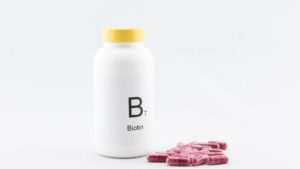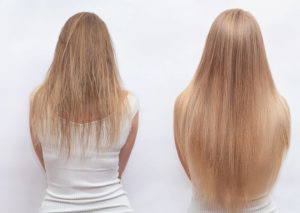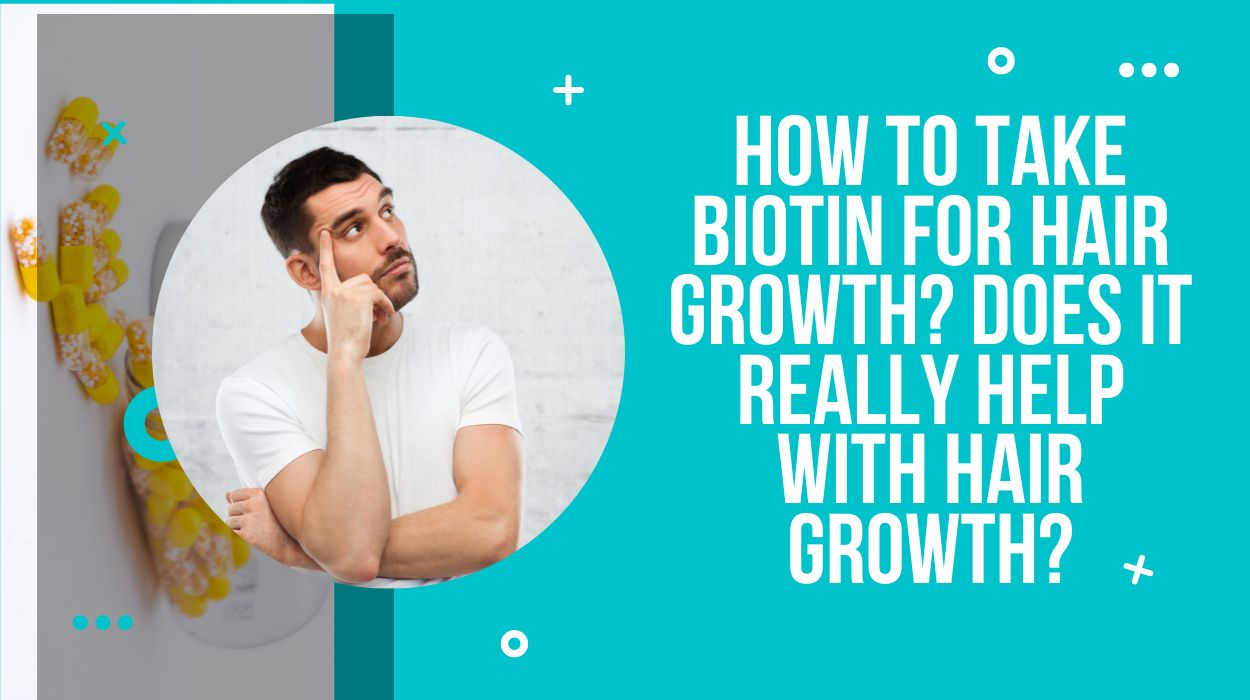Thick and luscious hair is the dream of every individual, however, not everyone is blessed with it. And in an attempt to achieve your dream hair goals, perhaps you might have tried out different things, one of them being biotin, be it from food or supplements. But none of them seemed to be very effective.
Now the big question is, what is the right way of taking biotin, and does it really help with hair growth? While there is sparse data on how biotin helps with hair growth, a few studies point out its effectiveness for growing luscious locks.
Therefore, in this article, we will tell you how effective is biotin for hair growth, sources of biotin, and, its recommended dosage, etc.
So shall we begin?
What Exactly Is Biotin?
 Simply put, biotin is an essential nutrient that belongs to the vitamin B group. It is required by the body to convert food into energy, improve hair, nails, and skin health and promote healthy metabolism, etc. It is also known as vitamin H. Lack of biotin in the body can cause various hair and skin problems. Biotin helps in supporting metabolism, improving hair and nail health, regulating blood sugar levels and supporting pregnancy and lactation, etc.
Simply put, biotin is an essential nutrient that belongs to the vitamin B group. It is required by the body to convert food into energy, improve hair, nails, and skin health and promote healthy metabolism, etc. It is also known as vitamin H. Lack of biotin in the body can cause various hair and skin problems. Biotin helps in supporting metabolism, improving hair and nail health, regulating blood sugar levels and supporting pregnancy and lactation, etc.
It can be found in certain foods. Moreover, since biotin is a water-soluble vitamin and our body cannot store these vitamins, people need to get them through their diets or health supplements.
Food Sources Of Biotin
 Some examples of foods rich in biotin are:
Some examples of foods rich in biotin are:
- Liver & Kidney Meat
- Fish
- Egg yolks
- Cheese
- Curd
- Milk
- Sunflower Seeds
- Sweet Potato
- White Mushroom
- Whole Grains
- Legumes
- Spinach
- Cauliflower
- Banana
- Avocado
- Nuts (almonds, walnuts, peanuts, etc.)
Author’s Note: We recommend you to go for unprocessed/raw biotin-rich foods containing biotin since heat can decrease its effectiveness.
Does Biotin Really Help With Hair Growth?
Before you decide whether to opt for biotin supplements or not, let’s dive deeper into how it works for hair growth. To begin with, taking biotin either as a supplement or with a diet can boost the production of keratin in hair and may increase the growth rate of the hair follicles.
Keratin is a type of protein that forms the structure of the hair. Therefore, you need to provide your body with the nutrients it needs if you want your hair follicles to produce hair.
Moreover, according to studies, consuming an adequate amount of biotin regularly help metabolize amino acids, which stimulate hair keratin. That’s how biotin is beneficial for growing healthy hair.
How Quickly Does Biotin Grow Hair?
 Just like other health supplements, biotin also doesn’t magically grow your hair overnight. However, most people begin noticing a visible difference in their hair in just 1 month. So every individual’s experience with biotin varies according to their metabolism, diet, and body type.
Just like other health supplements, biotin also doesn’t magically grow your hair overnight. However, most people begin noticing a visible difference in their hair in just 1 month. So every individual’s experience with biotin varies according to their metabolism, diet, and body type.
According to the Ablon Skin Institute Research Center study, biotin can increase the growth and shine of hair in less than 90 days. Also, you need to keep in mind that even though biotin can make your hair thicker and luscious in just a few months, it doesn’t mean that it can increase the number of your hair strands. In other words, biotin can significantly improve your hair’s texture, but it can’t grow new hair on your head.
Author’s Note: Tip: You need to be consistent with biotin intake for at least 3 months to start seeing good results.
What Does Research Tell Us About Biotin For Hair Growth?
Keratin is a basic component that forms your hair, nails, and skin. While it is understood that biotin boosts the keratin production of your body, researchers are not certain about the role of biotin in hair and skin.
Research on how biotin helps with hair growth is sparse. So far, there is only a little evidence showing that increasing your biotin intake can help stimulate hair growth.
For instance, in 2015, a study was carried out on women participants who had the problem of hair fall. They were given an oral supplement containing biotin for a duration of 3 months. The result showed that those women experienced less hair fall and growth of new hair on the bald patches of their scalp.
Furthermore, in 2017 review of the previous study found that the participants taking biotin already had its deficiency. Therefore, their hair growth improved after they took biotin supplements.
Although there are some small studies that show promising outcomes, the National Institutes of Health (NIH) states that there is only a little evidence to assess the efficacy of biotin in hair fall treatment. So more research is required to determine how effective biotin is for hair growth.
What Is The Recommend Daily Intake For Biotin?
Since biotin deficiency is rare, the Food and Drug Administration has not stated a recommended dietary allowance (RDA) for it. Recommend dosage differs according to the person’s gender, age, and body type.
However, according to the National Institutes of Health, people who are 19 years old or above need to get 30 mcg of biotin daily. Most people can get this dosage through their diet itself.
Children and teenagers are advised to consume somewhere between 5-25 mcg daily. Moreover, breastfeeding mothers need to consume around 35 mcg every day.
You need to consult your dietician to determine the right dosage for you. Moreover, you can either fulfill your recommended biotin intake through your diet or take its supplements.
Author’s Note: If you take biotin, you need to drink a lot of water daily since it is a water-soluble vitamin and may cause acne and breakouts.
Are There Any Health Risks Associated With Biotin Overdose?
Because biotin is a water-soluble vitamin, its high levels in your body are flushed out from your body through urine. As a result, a biotin overdose is unlikely.
However, if you notice any unusual skin rash, digestive problems, excessive thirst and, urination, etc., after increasing your biotin consumption, consult your doctor right away as it could be a sign of biotin overdose (in rare cases).
What Are The Symptoms Of Biotin Deficiency?
Now that you the recommended dosage and potential side effects of biotin, let’s also have a look at the symptoms that can appear when you are deficient in biotin. Some common symptoms of biotin deficiency include:
- Brittle hair & nails
- Hair loss
- Red rashes on the skin
- Scaly and dry skin
- Fatigue
- Muscle cramps
- Loss of appetite
- Nausea
- Dry eyes
- Insomnia
- Depression
- Digestive problems
FAQs
- What are the side effects of taking biotin for hair growth?
Generally, most people can consume biotin supplements without showing any side effects. However, a few minor side effects such as diarrhea, nausea, and muscle pain, etc., are possible in some individuals.
- Can too much biotin be bad for your hair?
While there is little research on the health effects of taking biotin supplements, a high intake might interfere with certain lab test results.
- Does taking biotin for hair growth change your skin also?
Yes, if you take oral biotin pills, both your hair as well as your skin can change positively. Biotin makes the oil glands function properly and increases the production of fatty acids, which are required to nourish the skin.
- Does taking biotin to grow out body hair too?
Biotin, like any other hair growth product, is often misunderstood as having the ability to make your body hair grow out as well. This isn’t true because your body’s hair follicles don’t grow in the same way as does your scalp’s. Therefore, your body hair is only supposed to grow to a specific length.
Conclusion
Taking biotin can help to a certain extent if you’re experiencing hair fall issues, as backed by research. Also, if you’re taking a biotin supplement, talk to your doctor to determine the right dosage for you.
However, you need to bear in mind that biotin supplements aren’t an approved treatment for hair problems.
Rather, they just help in improving the texture of your hair and prevent them from breaking. Moreover, the type and amount of biotin you take can also affect the results.
In case you see any side effects after consuming biotin supplements, stop taking them right away and check with your doctor. Also, if you have any other questions, drop them down in the comment section. We will get back to you soon!


